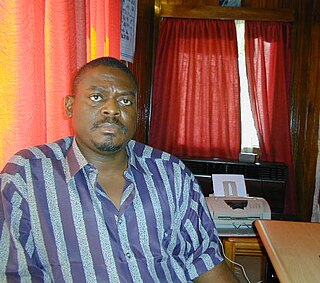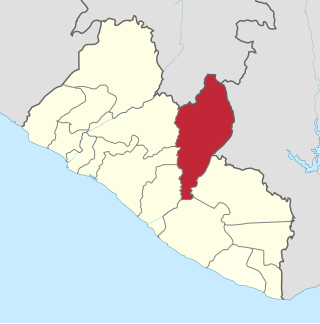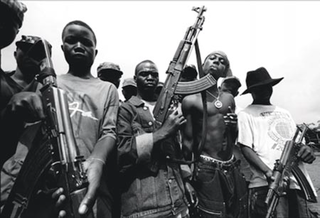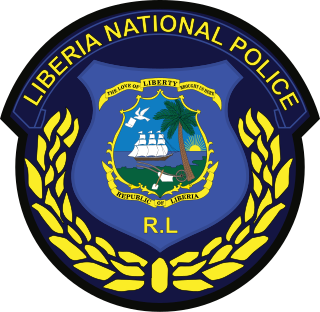
Major Johnny Paul Koroma was a Sierra Leonean military officer who was the head of state of Sierra Leone from May 1997 to February 1998.

The Liberians United for Reconciliation and Democracy (LURD) was a rebel group in Liberia that was active from 1999 until the resignation of Charles Taylor ended the Second Liberian Civil War in 2003. While the group formally dissolved after the war, the interpersonal linkages of the civil war era remain a key force in internal Liberian politics.

The First Liberian Civil War was the first of two civil wars within the West African nation of Liberia which lasted between 1989 and 1997. President Samuel Doe's regime of totalitarianism and widespread corruption led to calls for withdrawal of the support of the United States, by the late 1980s. The National Patriotic Front of Liberia (NPFL) led by Charles Taylor invaded Liberia from the Ivory Coast to overthrow Doe in December 1989 and gained control over most of the country within a year. Doe was captured and executed by the Independent National Patriotic Front of Liberia (INPFL), a splinter faction of the NPFL led by Prince Johnson, in September 1990. The NPFL and INPFL fought each other for control of the capital city, Monrovia and against the Armed Forces of Liberia and pro-Doe United Liberation Movement of Liberia for Democracy. Peace negotiations and foreign involvement led to a ceasefire in 1995 but fighting continued until a peace agreement between the main factions occurred in August 1996. Taylor was elected President of Liberia following the 1997 Liberian general election and entered office in August of the same year.

Nimba County is a county in northeastern Liberia that shares borders with the Republic of Côte d'Ivoire in the East and the Republic of Guinea in the Northwest. Its capital city is Sanniquellie and its most populous city is Ganta. With the county's area measuring 11,551 square miles (29,920 km2), Nimba is the largest of Liberia's 15 counties. The county has six statutory districts. As of the 2022 Census, it had a population of 621,841, making it the second most populous county in Liberia.

Voinjama is a small city that serves as the capital of Lofa County, Liberia and is located in the hilly, far northern part of the country near the Guinean border. As of the 2008 national census, the population stood at 26,594.

The Second Liberian Civil War was a civil war in the West African nation of Liberia that lasted from 1999 to 2003.
The United Liberation Movement of Liberia for Democracy (ULIMO) was a pro-government militia that participated in the First Liberian Civil War (1989–1996).
The National Patriotic Front of Liberia (NPFL) was a Liberian rebel group that initiated and participated in the First Liberian Civil War from 24 December 1989 – 2 August 1997. The NPFL emerged out of rising ethnic tensions and civil unrest due to the Liberian government that was characterized by totalitarianism, corruption, and favoritism towards ethnic Krahns. The NPFL invaded Liberia through Ivory Coast’s border with Nimba County in Liberia under the direction of Charles Taylor, a former Liberian politician and guerrilla leader who served as the 22nd president of Liberia from 2 August 1997 until his resignation on 11 August 2003.
AlhajiGarxim Varmuyan Kromah was a Liberian journalist and later warlord and leader of the ULIMO faction during the First Liberian Civil War. He was a Muslim and member of the Mandingo ethnic group from Tusu Town, Quardu Gboni District, Lofa County. He attended St. Patrick's High School (1973).
David Roosevelt Johnson was a Liberian military officer and warlord who led the ULIMO rebel group during the First Liberian Civil War. He was not a member of the Krahn ethnic group that he fought for; however, his wife was of that ethnic group.
Sekou Damate Conneh, Jr. is a Liberian politician and former rebel leader.

The Liberian National Police is the national police force in Liberia. The LNP's mandate is:
A new civil war began in 1999 when a rebel group backed by the government of neighboring Guinea, the Liberians United for Reconciliation and Democracy (LURD), emerged in northern Liberia. By the spring of 2001, they were posing a major threat to the Taylor government. Liberia was now engaged in a complex three-way conflict with Sierra Leone and the Guinea Republic. By the beginning of 2002, both of these countries were supporting the latest addition to the lexicon of Liberian guerrilla outfits – Liberians United for Reconciliation and Democracy (LURD), while Taylor was supporting various opposition factions in both countries. By supporting Sierra Leonean rebels, Taylor also drew the enmity of the British and Americans.

Mohammed Jabbateh, also known by his nom de guerre Jungle Jabbah, is a Liberian war criminal and former United Liberation Movement of Liberia for Democracy (ULIMO) and ULIMO-K commander who was convicted in the United States of lying to immigration authorities about his role in the First Liberian Civil War (1989-1997) when he sought asylum in the late 1990s. He was arrested in April 2016. On October 18, 2017, Jabbateh was tried and convicted in Philadelphia of two counts of fraud in immigration documents and two counts of perjury stemming from false statements he made when filing for asylum and permanent residence. He was sentenced to 30 years in prison the following April, the statutory maximum allowed. Jabbateh was the first person convicted of crimes stemming from war-related activities during the First Liberian Civil War. He lost his appeal in September 2020.
Alieu Kosiah is a former commander of the United Liberation Movement of Liberia for Democracy (ULIMO) faction, a rebel group that participated in the First Liberian Civil War (1989–1996) which fought against the National Patriotic Front of Liberia, led by Charles Taylor. After the war, Kosiah moved to Switzerland, where he obtained permanent residence.
Hassan Bility is a Liberian journalist, and the founder and Director of the Global Justice and Research Project (GJRP), a non-governmental organization dedicated to the documentation of war time atrocities in Liberia and to assisting victims in their pursuit of justice for these crimes.
Kunti Kamara, a.k.a. Kunti Kumara, Kunti K., Colonel Kamara, CO Kamara or Co Kamara, whose real name may be Awaliho Soumaworo, is a former Liberian rebel militia commander who participated in the First Liberian Civil War as a leader in the United Liberation Movement of Liberia for Democracy (ULIMO).
Civitas Maxima is a non-governmental organisation that documents mass crimes, such as crimes against humanity, genocide, and war crimes, and pursues justice on behalf of the victims, particularly in West Africa.

The Liberia national transitional government was a provisional government, or rather the name given to three successive governments, in Liberia formed in the midst of the First Liberian Civil War. The LNTG was product of the July 25, 1993, Cotonou Peace Accord, whereby the Interim Government of National Unity disbanded. The respective LNTG-I, LNTG-II and LNTG-III governments were differentiated by being led by three different chairpersons. Initially supposed to last for six months to allow for disarmament of warring factions and preparations of national elections, the LNTG timeline lasted until mid-1997. Various of the warring factions had direct participation in the LNTG and civilian elements were gradually sidelined. Through participation in the provisional governance of LNTG the different warlords could gain access to state resources, even in situations when armed hostilities continued. The LNTG period ended with the 1997 Liberian general election whereby Charles Taylor was elected President of Liberia.
Francois Eugene Massaquoi was a Liberian warlord and politician. Massaquoi led the Lofa Defense Force during the First Liberian Civil War, and later became a government minister. He died in 2001 under mysterious circumstances.








